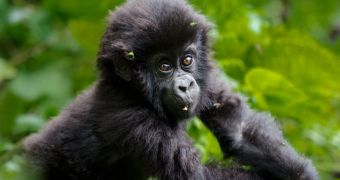The Democratic Republic of the Congo, Rwanda, and Uganda have recently announced plans to work together on implementing conservation measures intended to help mountain gorillas from falling off the biodiversity map.
Presently, the International Union for Conservation of Nature considers this species to be a critically endangered one. Thus, the World Wildlife Fund says that, according to recent counts, around 880 mountain gorillas are now left in the wild.
By the looks of it, the Democratic Republic of the Congo, Uganda, and Rwanda, all of which serve as a home to wild populations of mountain gorillas, believe that they can save this species from extinction by maximizing the economic benefits that these animals bring to local communities.
According to the World Wildlife Fund, the three countries want to work together not only to protect mountain gorilla habitat that spans their shared borders, but also to attract tourists to the regions inhabited by these critically endangered great apes.
Such tourist activities would constitute a source of income for local communities and would help show that protecting this species can yield noteworthy financial benefits, Uganda, Rwanda, and the Democratic Republic of the Congo believe.
“A portion of the revenue from gorilla tourism is shared with the communities surrounding the animals’ habitats. This creates a strong incentive to protect the animals and the natural setting where they live,” great ape expert David Greer said in a statement.
Since tourists do not just magically appear in one region and then depart in a space ship or the like, odds are economic benefits will be documented on a national scale. As the World Wildlife Fund specialist put it, “Visitors also spend money elsewhere during their trip, and that helps the national economy as a whole.”
It is estimated that, presently, Uganda's and Rwanda's tourism industry, which happens to be largely linked to mountain gorillas, constitutes about 8-9% of the total gross domestic products. What's more, the World Wildlife Fund says that, given the right policies, tourism in the Democratic Republic of the Congo's Virunga National Park can hit an annual worth of $235 million (about €171.28 million).
The trouble is that, thanks to a United Kingdom company dubbed Soco International PLC, that plans to debut seismic testing in the Virunga National Park later this month, and also due to the fact that this protected region has had 85% of its surface allocated as oil concessions, the Democratic Republic of Congo risks losing quite a lot of its biodiversity.

 14 DAY TRIAL //
14 DAY TRIAL //